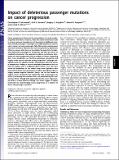Impact of deleterious passenger mutations on cancer progression
Author(s)
Korolev, Kirill Sergeevich; Sunyaev, Shamil R.; McFarland, Christopher D.; Kryukov, Gregory V.; Mirny, Leonid A
DownloadMirny-2013-The impact of deleterious passenger mutations on cancer progression.pdf (901.7Kb)
PUBLISHER_POLICY
Publisher Policy
Article is made available in accordance with the publisher's policy and may be subject to US copyright law. Please refer to the publisher's site for terms of use.
Terms of use
Metadata
Show full item recordAbstract
Cancer progression is driven by the accumulation of a small number of genetic alterations. However, these few driver alterations reside in a cancer genome alongside tens of thousands of additional mutations termed passengers. Passengers are widely believed to have no role in cancer, yet many passengers fall within protein-coding genes and other functional elements that can have potentially deleterious effects on cancer cells. Here we investigate the potential of moderately deleterious passengers to accumulate and alter the course of neoplastic progression. Our approach combines evolutionary simulations of cancer progression with an analysis of cancer sequencing data. From simulations, we find that passengers accumulate and largely evade natural selection during progression. Although individually weak, the collective burden of passengers alters the course of progression, leading to several oncological phenomena that are hard to explain with a traditional driver-centric view. We then tested the predictions of our model using cancer genomics data and confirmed that many passengers are likely damaging and have largely evaded negative selection. Finally, we use our model to explore cancer treatments that exploit the load of passengers by either (i) increasing the mutation rate or (ii) exacerbating their deleterious effects. Though both approaches lead to cancer regression, the latter is a more effective therapy. Our results suggest a unique framework for understanding cancer progression as a balance of driver and passenger mutations.
Date issued
2013-02Department
Massachusetts Institute of Technology. Institute for Medical Engineering & Science; Harvard University--MIT Division of Health Sciences and Technology; Massachusetts Institute of Technology. Department of Physics; Massachusetts Institute of Technology. School of EngineeringJournal
Proceedings of the National Academy of Sciences of the United States of America
Publisher
National Academy of Sciences (U.S.)
Citation
McFarland, C. D., K. S. Korolev, G. V. Kryukov, S. R. Sunyaev, and L. A. Mirny. “Impact of deleterious passenger mutations on cancer progression.” Proceedings of the National Academy of Sciences 110, no. 8 (February 19, 2013): 2910-2915.
Version: Final published version
ISSN
0027-8424
1091-6490